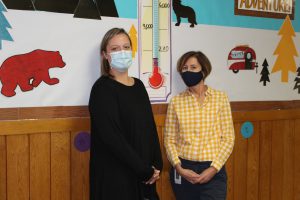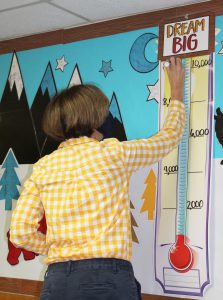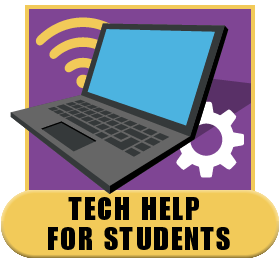Pleasant Avenue Literacy Program Goes Virtual to Encourage Daily At-Home Reading and Family Engagement
K-2 students tasked with reading 10,000 books this year, with JEPTA kicking off the initiative by donating a book to each child

Pleasant Avenue Elementary AIS teachers Rachel Harrington and Nancy Lisicki – who both serve on the school’s Literacy Committee – stand in front of a giant thermometer that will be used to track how many books have been read by Johnstown’s K-2 students.
Pleasant Avenue Elementary Principal Cory Cotter, the K-2 teaching staff at Johnstown and JEPTA (Johnstown Elementary Parent Teacher Association) are all working together to promote a very consistent message to their students and families this year: READING MATTERS! Indeed, statistics show that by reading for just 20 minutes a day, a child will be exposed to nearly two million words a year, which can have a tremendous impact on a child’s success in school and beyond.
In a year full of unique challenges presented by COVID-19 and the implementation of virtual learning, Cotter decided it was time to brainstorm with her team on how to modernize the Literacy Program at Pleasant Avenue to keep up with the changing landscape of learning.
Instead of monthly Literacy Nights being held in-person at Pleasant Avenue, the team decided to move the activity to an online platform. Virtual Literacy Nights are held at 6:00 p.m. on the second Tuesday of each month, with each session featuring two mystery guest readers who read a book to the students and families that tune in.
The first Virtual Literacy Night was held in November and featured mystery guest readers Nancy Lisicki (AIS teacher and Johnstown Teachers Association President) and Rachel Harrington (AIS teacher), who have both been very involved in helping to reshape the Literacy Program at Pleasant Avenue as members of the Literacy Committee.
Cotter sees the Virtual Literacy Nights as a way for a student’s entire family to engage in the learning experience. “We know that one of the most influential factors in a child’s success at school is their learning environment at home,” Cotter said. “When a child has a supportive network at home and is surrounded by people who are involved in their learning, they absolutely thrive in the classroom. By going virtual with this monthly event, we’re hopeful that kids find it easier to participate and that parents will see this as a fun learning activity that they can do with their child,” she added.
The next Virtual Literacy Night will be held at 6:00 p.m. on Tuesday, December 8. Families can participate by logging in to the Virtual Literacy link that will be posted in students’ SeeSaw classrooms and shared on ParentSquare.
The Virtual Literacy Nights align perfectly with one of the goals that Superintendent of Schools Dr. William Crankshaw put forth to his team at the beginning of this school year. “One of my priorities this year is to raise the academic profile for GJSD and these virtual reading events are a fantastic step in that direction,” Crankshaw said. “In a rather challenging time, this is a really creative way to keep both students and parents engaged in the learning process while also nurturing the very important partnership between school and home. Family connectedness is a crucial element to successful learning for our students,” he added.
Another way to keep students on task with their reading responsibilities this year has been to incentivize them. The Literacy Committee and Cotter challenged each student to personally read ten books a month and for the entire student body at Pleasant Avenue to complete at least 10,000 books this school year. To help kick off the initiative, JEPTA (Johnstown Elementary Parent Teacher Association) very graciously donated one book to every single child at Pleasant Avenue Elementary.
“JEPTA sees literacy as a priority initiative, especially for our youngest learners in the Johnstown School District,” said Meghan Heroth, President of JEPTA. “As parents and volunteers in the school, we have seen first-hand how reading has helped our students thrive academically and how books can help to stimulate a child’s imagination. This was a project that we were happy to help support.”

AIS teacher Nancy Lisicki fills in the giant thermometer that will be used to track how many books are read by K-2 students at Pleasant Avenue Elementary.
Lisicki and Harrington have been tasked with keeping track of how many books the K-2 students have read or listened to. Their thermometer-like book tracker is posted on a bulletin board outside of the main office at Pleasant Avenue. So far in the month of November, students have completed 2,911 books and are on pace to pass the 10,000 mark by March, 2021 – ahead of Cotter’s May deadline.
Another important change to the Pleasant Avenue Literacy Program this year is the implementation of a new reading system called Raz-Kids, which replaces the Accelerated Reader program. “The biggest benefit to the Raz-Kids program is that books of all different reading levels are available online,” Cotter said. “We didn’t want any obstacles to get in the way of our kids reading, and in a time when physical access to books might be limited, we knew the only way to keep our kids’ reading levels up was to make sure they could read their books online.”
The Raz-Kids program includes other high-tech features to help support independent reading, such as note taking and highlighting, along with functionality to read key words aloud and even define them. The program features a user-friendly digital monitoring system to keep track of how many books each student has completed and how many minutes they’ve spent reading. In addition to reading close to 3,000 books in the month of November, students in K-2 also logged 12,171 Raz-Kid minutes!



